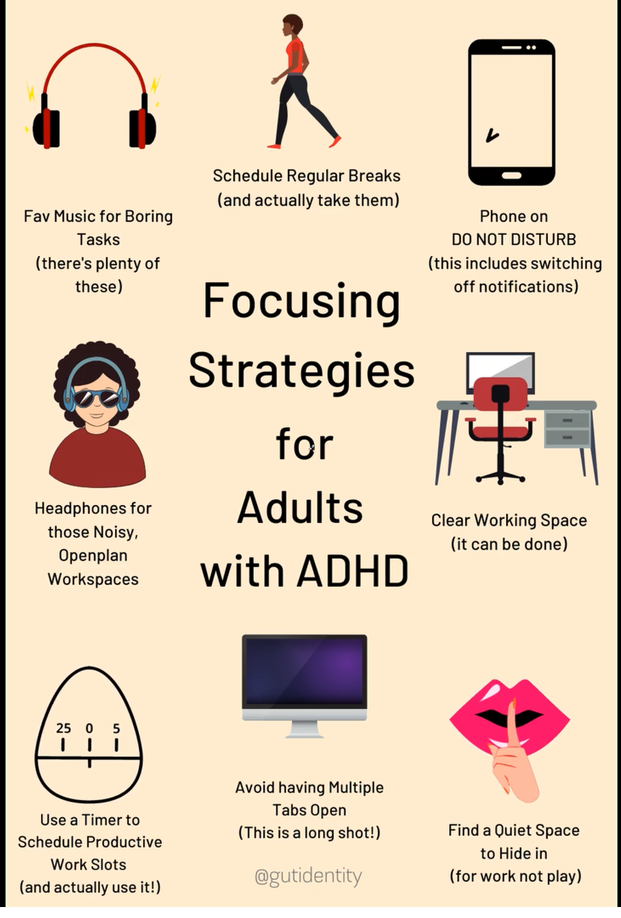Adult ADHD: From Suspicion To Support And Management

Table of Contents
Recognizing the Symptoms of Adult ADHD
Adult ADHD often presents differently than childhood ADHD. While hyperactivity might be less pronounced, symptoms like difficulty focusing and impulsivity remain significant challenges. Understanding these adult manifestations is crucial for early recognition. These common symptoms can significantly impact daily life:
-
Difficulty Prioritizing Tasks: Feeling overwhelmed by even simple to-do lists, constantly switching between tasks without completing any, leading to unfinished projects and missed deadlines. For example, starting several work projects simultaneously and ending up with none properly completed.
-
Procrastination: Delaying tasks, even important ones, until the last minute, despite knowing the negative consequences. This often stems from feeling overwhelmed or lacking the motivation to start.
-
Poor Time Management: Consistently running late, misjudging how long tasks will take, and struggling to meet deadlines. This can lead to stress and missed opportunities.
-
Impulsivity: Acting without thinking, making hasty decisions with unintended consequences, interrupting conversations frequently, and engaging in risky behaviors. This can impact relationships and financial stability.
-
Forgetfulness: Frequently misplacing items, forgetting appointments or commitments, and experiencing lapses in memory. This can cause frustration and impact work and social life.
-
Restlessness: Feeling an internal urge to move, fidgeting constantly, difficulty sitting still for extended periods, and needing constant stimulation.
-
Emotional Dysregulation: Experiencing intense emotional swings, difficulty managing emotions, and reacting disproportionately to situations. This can affect relationships and overall well-being.
-
Relationship Challenges: Struggling to maintain relationships due to impulsivity, poor communication, and difficulty with emotional regulation. This can lead to conflict and isolation.
It's vital to remember that experiencing some of these symptoms doesn't automatically mean you have ADHD. Many other conditions share similar symptoms. If you recognize several of these symptoms, consider seeking a professional evaluation to rule out other possibilities and receive an accurate diagnosis.
The Diagnostic Process for Adult ADHD
Getting a diagnosis for Adult ADHD involves a thorough assessment process. It's crucial to find a qualified professional experienced in diagnosing ADHD in adults. The process generally includes:
-
Self-Reporting Questionnaires: These questionnaires, such as the ASRS-V1.1, help assess the presence and severity of ADHD symptoms based on self-reported experiences.
-
Clinical Interviews: A detailed interview with a healthcare professional to discuss symptoms, their impact on daily life, and personal history. This allows for a comprehensive understanding of your experiences.
-
Neuropsychological Testing: In some cases, neuropsychological testing might be recommended to assess cognitive functions and rule out other conditions.
-
Ruling Out Other Conditions: It's essential to rule out other conditions with overlapping symptoms, such as anxiety, depression, or learning disabilities.
Healthcare professionals involved in the diagnostic process may include psychiatrists, psychologists, or neurologists. The process can sometimes be lengthy, requiring patience and persistence. Finding the right professional is key. [Link to reputable resource for finding qualified ADHD professionals]
Effective Treatment Options for Adult ADHD
Treatment for Adult ADHD typically involves a holistic approach, combining different strategies to address individual needs. Effective treatment options include:
-
Medication: Stimulant and non-stimulant medications are commonly prescribed to help manage symptoms like inattention, impulsivity, and hyperactivity. These medications can have side effects, so close monitoring is essential.
-
Therapy: Cognitive Behavioral Therapy (CBT) can help individuals develop coping mechanisms and strategies to manage ADHD symptoms. Coaching can offer personalized support and guidance.
-
Lifestyle Changes: Improving diet, increasing regular exercise, and prioritizing good sleep hygiene can significantly impact symptom management.
-
Organizational Strategies: Implementing organizational tools and techniques can help improve focus, time management, and productivity.
Finding the right combination of treatments is crucial. What works for one person might not work for another. Support groups and online communities can provide valuable peer support and additional strategies.
Building a Support System for Managing Adult ADHD
A strong support system is essential for managing Adult ADHD. This network can provide emotional support, practical assistance, and encouragement. Building a supportive network involves:
-
Family and Friends: Educating loved ones about ADHD and its impact can foster understanding and improve communication.
-
Therapists: Therapy provides a safe space to process emotions, develop coping skills, and address challenges related to ADHD.
-
Support Groups: Connecting with others who share similar experiences can reduce feelings of isolation and provide valuable support.
-
Coaches: Coaches can offer personalized guidance and support in various areas of life, helping individuals set goals and develop strategies for success.
-
Workplace Accommodations: Advocating for oneself in the workplace and accessing necessary accommodations can significantly improve work performance and reduce stress.
Self-compassion and acceptance are crucial. Managing Adult ADHD is a journey, not a destination. Remember to celebrate your successes and be kind to yourself during challenging times.
Conclusion
Suspecting you have Adult ADHD can be a challenging but crucial first step. Understanding the symptoms, navigating the diagnostic process, and exploring effective treatment options are key to finding the support and management strategies you need. Remember that managing ADHD is a journey, not a destination, and finding the right combination of support and strategies is essential for improving your quality of life. If you suspect you may have Adult ADHD, don't hesitate to take the first step towards seeking a professional evaluation. Early diagnosis and intervention can significantly improve your overall well-being. Start your journey toward better management of Adult ADHD today. Find a qualified professional and begin your path to a more fulfilling life.

Featured Posts
-
 Post Roe America How Otc Birth Control Changes The Landscape
Apr 29, 2025
Post Roe America How Otc Birth Control Changes The Landscape
Apr 29, 2025 -
 Us Aid Sought By Lynas Rare Earths For Texas Refinery Due To Escalating Costs
Apr 29, 2025
Us Aid Sought By Lynas Rare Earths For Texas Refinery Due To Escalating Costs
Apr 29, 2025 -
 Packers 2025 International Game Prospects Two Chances To Shine Abroad
Apr 29, 2025
Packers 2025 International Game Prospects Two Chances To Shine Abroad
Apr 29, 2025 -
 The Countrys Booming Business Regions Locations And Opportunities
Apr 29, 2025
The Countrys Booming Business Regions Locations And Opportunities
Apr 29, 2025 -
 D C Air Crash Examining The Spread Of False Information Online
Apr 29, 2025
D C Air Crash Examining The Spread Of False Information Online
Apr 29, 2025
Latest Posts
-
 Amanda Owen Facing Challenges And Sharing A Family Update From Ravenseat
Apr 30, 2025
Amanda Owen Facing Challenges And Sharing A Family Update From Ravenseat
Apr 30, 2025 -
 Life On Our Farm Next Door Following Amanda Clive And Family
Apr 30, 2025
Life On Our Farm Next Door Following Amanda Clive And Family
Apr 30, 2025 -
 The Amanda Owen Clive Divorce A Look At The Latest Heated Exchange
Apr 30, 2025
The Amanda Owen Clive Divorce A Look At The Latest Heated Exchange
Apr 30, 2025 -
 Amanda Owens Ravenseat Family Update And Challenges Faced
Apr 30, 2025
Amanda Owens Ravenseat Family Update And Challenges Faced
Apr 30, 2025 -
 Amanda Owen Faces Emotional Turmoil Amidst Divorce From Clive
Apr 30, 2025
Amanda Owen Faces Emotional Turmoil Amidst Divorce From Clive
Apr 30, 2025
